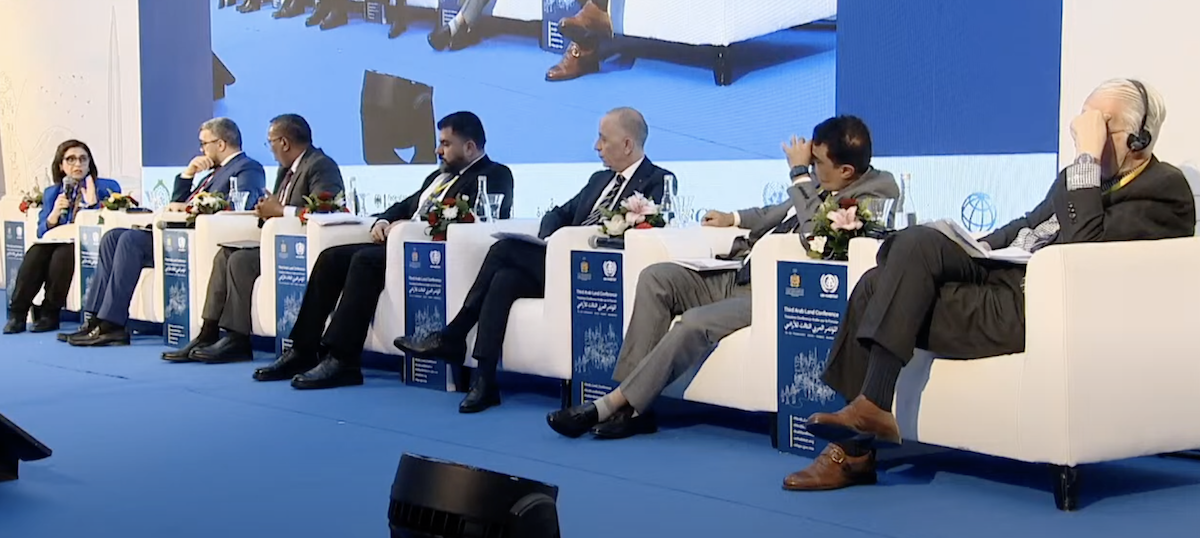The High-Level Session on Land Management in Times of Crisis at the Third Arab Land Conference convened policymakers, experts, and practitioners to explore how effective land governance can mitigate these challenges, prevent future conflicts, and drive resilience.
Speakers addressed land restitution in post-conflict settings, the role of digital land registries, climate resilience, and financing mechanisms for reconstruction. They shared country-specific case studies from Syria, Palestine, Iraq, Libya, Somalia, and Yemen, offering insights into how land management can contribute to peacebuilding, economic recovery, and sustainable development.
Key Takeaways from the High-Level Session
1. The Role of Land Governance in Conflict Prevention and Peacebuilding
Dr. Paulo Sérgio Pinheiro, Chair of the Independent International Commission of Inquiry on the Syrian Arab Republic, opened the session by highlighting how poor land governance exacerbates conflicts and fuels displacement.
“Sustainable land management is critical both to address the structural issues that lead to conflict and to prevent them from reoccurring.”
He referenced the Pinheiro Principles on Housing and Property Restitution for Refugees and Displaced Persons, which provide a framework for ensuring displaced populations can reclaim their land and homes after conflicts.
“The failure to prevent and address housing, land, and property rights violations risks fueling further grievances, social tensions, and new cycles of violence.”
He stressed that land restitution should be part of broader transitional justice processes, ensuring displaced people—particularly women and marginalized groups—can reclaim their rights.
2. Palestine: Land as a Tool of Resistance and Survival
Mr. Alaa Tamimi, Head of the Palestinian Land Authority, spoke about the ongoing Israeli occupation and its impact on Palestinian land rights.
“Palestine has faced land dispossession for over 70 years. Colonization continues to take away our land and destroy livelihoods. But we remain steadfast—Palestine is either where we live, or where we are buried.”
He highlighted how land documentation, digital land registries, and legal frameworks are crucial for protecting Palestinian land rights. Despite Israeli military orders confiscating land, the Palestinian Land Authority has worked with Arab partners and UN-Habitat to digitize over 150,000 land records.
“We must document every piece of land. In Gaza, our land registry office was destroyed, but we continue archiving and preserving our land records—this is our form of resistance.”
3. Iraq: Land Restitution and Digital Transformation in Post-Conflict Recovery
Mr. Ahmed Luaebi, Director General of Judicial Relations, Iraq, detailed Iraq’s efforts to return land to displaced populations following the defeat of ISIS.
“The Iraqi government is prioritizing the restitution of land to those who were forcibly displaced. We are opening new land registry offices in liberated areas and ensuring that land claims are processed efficiently.”
He noted that land registries were destroyed during ISIS control, but Iraq has since launched a digital land platform to automate records and prevent fraud.
“Automation and digitalization are key to restoring trust in land governance, preventing corruption, and ensuring rightful ownership.”
4. Libya: Addressing Land Tenure Gaps and Climate Resilience
Mr. Badr Al-Deen Al-Toumi, Minister of Local Government, Libya, emphasized that Libya’s past land policies created significant tenure insecurities.
“Libya’s socialist land policies prevented private ownership, leaving many properties unregistered. After 2011, we saw widespread land disputes due to the lack of formal land records.”
He referenced the 2023 Derna floods, which wiped out entire neighborhoods, leaving many landowners dead or missing.
“Climate change makes land tenure security even more critical. We need comprehensive land registries to ensure reconstruction is fair and equitable.”
5. Somalia: The Intersection of Climate Change and Land Displacement
Mr. Elim Mohamud Nor, Minister of Public Works, Reconstruction, and Housing, Somalia, outlined how climate change is driving forced migration in Somalia.
“Somalia is caught in an endless cycle of extreme droughts and devastating floods. This is pushing rural populations into overcrowded cities, where land disputes and informal settlements are increasing.”
To manage these pressures, Somalia has launched a digital land registration system and partnered with international organizations to provide displaced communities with land tenure security.
“Land governance isn’t just about ownership—it’s about survival. Without secure land tenure, our people will remain vulnerable to exploitation and displacement.”
6. Yemen: Rebuilding After War and Managing Land for Stability
Mr. Waleed Radman Amer, Deputy Minister of Public Works and Infrastructure, Yemen, described how a decade of war has left Yemen’s land governance system in disarray.
“War has devastated Yemen’s infrastructure, disrupted land registries, and created legal uncertainties around land ownership.”
He emphasized the need for preemptive land management planning, climate adaptation, and digital records to help Yemen rebuild.
“Reconstruction will not succeed without clear land ownership frameworks and strong governance systems.”
7. The Role of International Solidarity and Financing in Land Recovery
A common theme throughout the session was the need for international support and financing to rebuild land governance systems. Dr. Paulo Sérgio Pinheiro called for global solidarity with conflict-affected countries, particularly Palestine and Syria.
“We cannot talk about land restitution without international solidarity. Palestine, Syria, Yemen, and others need global support, not just for rebuilding infrastructure but for restoring rights and justice.”
Speakers also emphasized the role of international financial institutions, such as the World Bank, the Islamic Development Bank, and climate adaptation funds, in supporting land recovery efforts.
“Post-conflict reconstruction requires substantial financing. Governments must work with regional and international partners to mobilize resources for land management and infrastructure resilience.” — Mr. Badr Al-Deen Al-Toumi
Key Conclusions and Next Steps
This session underscored that land management is not just a technical issue—it is a humanitarian, economic, and political imperative. Addressing land governance in times of crisis can:
- Prevent conflicts by securing land tenure and reducing land-related disputes.
- Support climate adaptation by ensuring resilient land-use planning and disaster preparedness.
- Facilitate post-war reconstruction by providing displaced populations with land restitution mechanisms.
- Boost economic recovery through land digitization, investment-friendly policies, and sustainable urban planning.
- Promote regional cooperation and international solidarity to address common land governance challenges.
As conflicts, climate pressures, and urbanization accelerate in the Arab world, proactive land management will be essential to building stability and resilience. This conference marks an important step toward developing policies, mobilizing resources, and fostering cooperation to secure a more equitable and sustainable future for the region.


